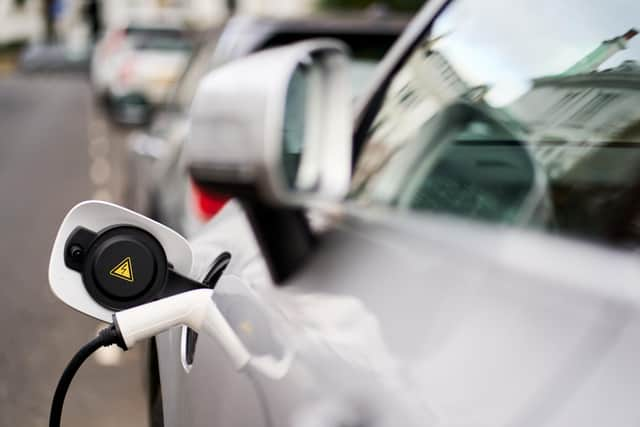Number of Doncaster electric vehicles rose significantly last year
and live on Freeview channel 276
The Government is aiming to entirely phase out petrol and diesel-powered cars by 2030, with battery electric vehicles planned to account for all car sales by 2035.
Auto Trader said the recent surge is positive, but that electric cars are still too expensive for many people to make the switch from petrol and diesel-powered vehicles.
Advertisement
Hide AdAdvertisement
Hide AdDepartment for Transport figures show there were 1,074 battery-electric vehicles in Doncaster at the end of last year – up from 811 at the end of 2020, a 32 per cent rise.


It meant 263 electric vehicles were newly registered in 2021 – though this was less than three-quarters the 404 the year before.
Across the UK, the number of electric vehicles on the roads almost doubled, increasing by 94% from 215,000 at the end of 2020 to 420,000 last year.
On average, an electric car will emit around one-third less carbon dioxide than an equivalent petrol or diesel car, Transport & Environment, a European clean transport campaign group, says.
Advertisement
Hide AdAdvertisement
Hide AdIan Plummer, who is the commercial director at Auto Trader, said the automotive industry has responded well to the Government's electric car drive.
Mr Plummer said: "Over the last year, we’ve seen significant strides in range capability, as well as a growing choice of makes, models and body types, right now there’s one new electric vehicle coming onto the market per week."
But he also stressed that there is a need to further invest in charging ports, saying that drivers must have confidence in being able to charge their own cars to help make the transition from fossil fuels.
The Government hopes to install 300,000 public charging points by the year 2030, 18 times the number a decade previously.
Advertisement
Hide AdAdvertisement
Hide AdThere is also concern regarding the price of electric vehicles, which still represent a small share of the overall automotive market, Mr Plummer said.
"With the average electric vehicle costing around 30 per cent more than traditionally fuelled alternatives, they remain out of reach for all but the most affluent car buyer," he concluded.
In these confusing and worrying times, local journalism is more vital than ever. Thanks to everyone who helps us ask the questions that matter by taking out a subscription or buying a paper. We stand together. Nancy Fielder, editor.
Comment Guidelines
National World encourages reader discussion on our stories. User feedback, insights and back-and-forth exchanges add a rich layer of context to reporting. Please review our Community Guidelines before commenting.
